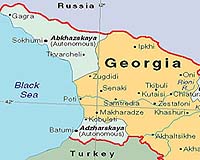| . |  |
. |
Washington (AFP) May 7, 2009 President Barack Obama said Thursday he was "hopeful" of improving ties between Washington and Moscow as the chief US and Russian diplomats vowed to put nuclear arms control above their row in Georgia. Obama took the unusual step of holding a full meeting with visiting Foreign Minister Sergei Lavrov as he works to repair US-Russian relations battered by a string of disputes late in the administration of former president George W. Bush. Earlier, Lavrov and his US counterpart, Secretary of State Hillary Clinton, declared that tension over the former Soviet state of Georgia will not torpedo negotiations to replace a Cold War-era nuclear arms control treaty. Obama said his wide-ranging talks with Lavrov focused on Iran, nuclear proliferation, Afghanistan and Pakistan, the Middle East, the financial crisis and other issues. "We have an excellent opportunity to reset the relationship between the United States and Russia on a whole host of issues," the president said. "I am hopeful that the meetings that we had so far and the meetings that we expect to have throughout the course of this year, will be of mutual benefit to both countries." Lavrov said the two sides were working in a "pragmatic" and "businesslike" way, as they seek to conclude a follow-on to the landmark Strategic Arms Reduction Treaty (START). Obama is set to travel to Russia for talks with Russian President Dmitry Medvedev in July, after their first meeting in London in March in which they pledged to seek a successor to START by the time it expires in December. The latest flare up in US-Russian relations came this week, as Georgia was hit by a military mutiny hours before NATO began a month-long 1,100-troop exercise in the country. Moscow strongly opposes the maneuvers. Tbilisi's pro-Western government has accused Russia of being behind the mutiny and a series of protests to oust Georgian President Mikhail Saakashvili. Both Clinton and Lavrov, who held a joint press conference after their meeting at the State Department, insisted plans for a START successor trumped their concerns over Georgia. "If you look at what we are doing on START and non-proliferation, that has to do with the future safety of the world and the United States and Russia bear a special responsibility," she added. "So we are working very hard together." Lavrov echoed her point. "The task of further reductions of strategic offensive weapons is too important for both Russia and for (the) US and, for the entire world in fact, to make it hostage of any particular regime anywhere around the globe," he said. Signed in 1991, START placed strict limits on the number of missiles and warheads that Moscow and Washington could have, leading to steep reductions in the nuclear arsenals of both sides. On Georgia, Clinton said that she believed Lavrov and the Russians "recognize that stability and a peaceful resolution to the tensions in Georgia is in everyone's interest." Lavrov hinted that Russia would be ready to allow monitors from the Organization for Security and Cooperation in Europe (OSCE) to return to South Ossetia, a breakaway Georgian region that Moscow backed in the war in August. "Of course, we need to find parameters that would be acceptable for all those who will be performing the missions," Clinton said. Twenty OSCE unarmed military observers have been deployed in Georgia since September 2008 but Moscow opposed renewing their mandate which expires June 30. The two top diplomats said they discussed how to help to revive stalled multilateral negotiations on disarming North Korea's nuclear arsenal. They also spoke about their joint participation in multilateral talks to press Iran to stop uranium enrichment that the United States fears is aimed at building a nuclear bomb. But they gave no sign that they could agree on US calls for tougher United Nations Security Council sanctions against Iran if the Obama administration's policy to engage diplomatically with the Islamic Republic fails. Share This Article With Planet Earth
Related Links Learn about the Superpowers of the 21st Century at SpaceWar.com Learn about nuclear weapons doctrine and defense at SpaceWar.com
 Finding The Hard Limits To Soft Power: Part One
Finding The Hard Limits To Soft Power: Part OneWashington (UPI) May 7, 2009 The way the 27-nation European Union handled the Russian invasion of Georgia last year invites some reflections about the merits of so-called soft diplomatic, cultural and economic power versus hard military power as the primary tools of international relations in the 21st century. The Russian Federation led by President Dmitry Medvedev and his predecessor, current Prime Minister Vladim ... read more |
|
| The content herein, unless otherwise known to be public domain, are Copyright 1995-2009 - SpaceDaily. AFP and UPI Wire Stories are copyright Agence France-Presse and United Press International. ESA Portal Reports are copyright European Space Agency. All NASA sourced material is public domain. Additional copyrights may apply in whole or part to other bona fide parties. Advertising does not imply endorsement,agreement or approval of any opinions, statements or information provided by SpaceDaily on any Web page published or hosted by SpaceDaily. Privacy Statement |